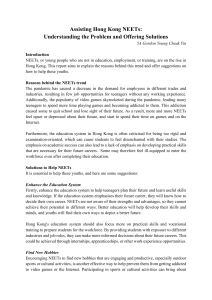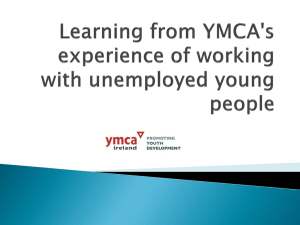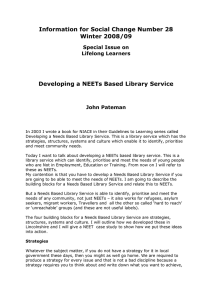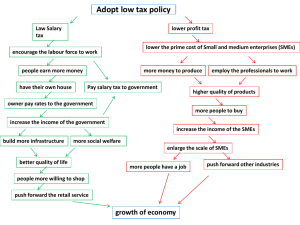Revolutionizing Careers. Turning NEETs into SME Social Media Managers
advertisement
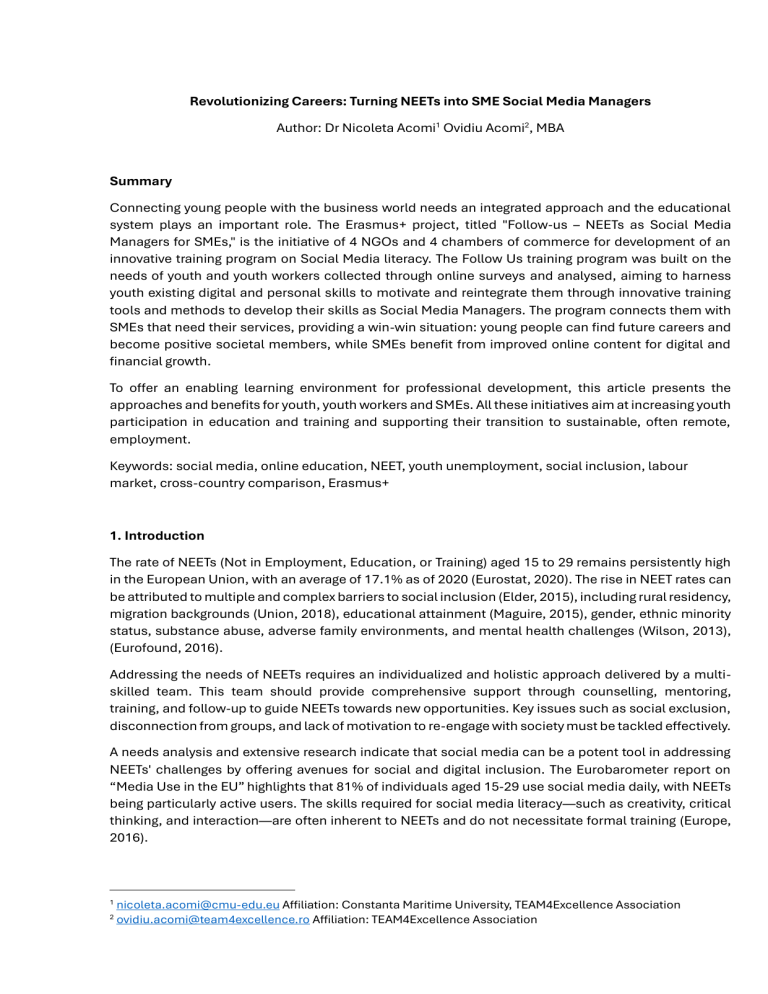
Revolutionizing Careers: Turning NEETs into SME Social Media Managers Author: Dr Nicoleta Acomi1 Ovidiu Acomi2, MBA Summary Connecting young people with the business world needs an integrated approach and the educational system plays an important role. The Erasmus+ project, titled "Follow-us – NEETs as Social Media Managers for SMEs," is the initiative of 4 NGOs and 4 chambers of commerce for development of an innovative training program on Social Media literacy. The Follow Us training program was built on the needs of youth and youth workers collected through online surveys and analysed, aiming to harness youth existing digital and personal skills to motivate and reintegrate them through innovative training tools and methods to develop their skills as Social Media Managers. The program connects them with SMEs that need their services, providing a win-win situation: young people can find future careers and become positive societal members, while SMEs benefit from improved online content for digital and financial growth. To offer an enabling learning environment for professional development, this article presents the approaches and benefits for youth, youth workers and SMEs. All these initiatives aim at increasing youth participation in education and training and supporting their transition to sustainable, often remote, employment. Keywords: social media, online education, NEET, youth unemployment, social inclusion, labour market, cross-country comparison, Erasmus+ 1. Introduction The rate of NEETs (Not in Employment, Education, or Training) aged 15 to 29 remains persistently high in the European Union, with an average of 17.1% as of 2020 (Eurostat, 2020). The rise in NEET rates can be attributed to multiple and complex barriers to social inclusion (Elder, 2015), including rural residency, migration backgrounds (Union, 2018), educational attainment (Maguire, 2015), gender, ethnic minority status, substance abuse, adverse family environments, and mental health challenges (Wilson, 2013), (Eurofound, 2016). Addressing the needs of NEETs requires an individualized and holistic approach delivered by a multiskilled team. This team should provide comprehensive support through counselling, mentoring, training, and follow-up to guide NEETs towards new opportunities. Key issues such as social exclusion, disconnection from groups, and lack of motivation to re-engage with society must be tackled effectively. A needs analysis and extensive research indicate that social media can be a potent tool in addressing NEETs' challenges by offering avenues for social and digital inclusion. The Eurobarometer report on “Media Use in the EU” highlights that 81% of individuals aged 15-29 use social media daily, with NEETs being particularly active users. The skills required for social media literacy—such as creativity, critical thinking, and interaction—are often inherent to NEETs and do not necessitate formal training (Europe, 2016). 1 2 nicoleta.acomi@cmu-edu.eu Affiliation: Constanta Maritime University, TEAM4Excellence Association ovidiu.acomi@team4excellence.ro Affiliation: TEAM4Excellence Association Conversely, EU Small and Medium Enterprises (SMEs) face challenges in effectively utilizing social media platforms due to a lack of digital skills and financial constraints (Commission, 2020) (European Commission, 2020). The pandemic's impact has underscored the need for SMEs to leverage social media to maintain visibility, reduce costs, and increase sales, thus navigating the digital transition more effectively. In this context, after the introduction of the subject (section 1 - Introduction), the following sections present the research conducted among youth to inform the development of a tailored training program, identifying key needs and preferences of youth (section 2 - Follow-us Training Programme), the survey conducted to assess the readiness of social inclusion workers to effectively deliver the Follow-us Training Programme (section 3 - The Trainer Upskill Course), the Follow-us Platform that connects Social Media Managers with SMEs that require their services (section 4 – Follow-us Platform). At the end, the Conclusions section states on how this win-win strategy enables NEETs to pursue sustainable careers and become active members of society, while SMEs benefit from enhanced online presence and digital capabilities. 2. Follow-us Training Programme 2.1. Research The first stage was dedicated to research, aiming at understanding the profiles of youth, including their likes and interests, educational levels, backgrounds, digital literacy, social competences, and knowledge of social media. The research team conducted a survey to assess the preferences of youth before developing a training program tailored to their needs. A sample of 201 individuals from various countries and backgrounds completed the survey, which was structured to take about 10 minutes per participant. The questionnaire assessed participants’ profiles, motivational factors, digital literacy, and social media skills. Respondents were from Spain - 26% of the answers, Germany and Romania with 22% of the answers, Poland with 18% of the answers, and Italy with 9% of the answers. The “other” respondents were from Ukraine, United Arab Emirates and Syria and accounted 2% of the answers. 2.2. Findings on survey Based on the responses, the research team came up with the conclusion that when designing the “Follow-us Training Programme for NEETs,” several key conclusions should be considered. The most common educational level completed by NEETs is high school, with completed VET studies relevant mainly in Spain and Germany. In contrast, a significant percentage of NEETs in Romania and Poland have completed a bachelor’s or master’s degree. Nearly 40% of respondents had not been employed or involved in training activities for a year or more. Childhood dream professions for NEETs included doctors, teachers, vets, policemen, and footballers, whereas their current aspirations were more inclined towards managers, IT engineers, and entrepreneurs. Common hobbies among NEETs are music, sports, and photography. Interactive learning emerged as the favourite teaching method for the course among NEETs. An overwhelming 92% of NEETs have access to digital devices, and half of the respondents are highly skilled in using Google Docs and MS Office. Social media usage is prevalent, with 93% of NEETs using it at least once a day, primarily to maintain connections with peers. NEETs typically browse content and occasionally publish posts or stories. A notable 86% are self-taught in their social media skills and competences. NEETs possess knowledge of leading social networks and mastery in their use, with Instagram being the most familiar platform. Professional and traditional platforms are more commonly known among those aged 25-29, while more recent platforms are better known by those aged 15-19. Creating visual content is the most interesting topic for NEETs, indicating a strong interest in developing skills related to visual media. 2.3. Results - The Follow-us Training Programme for NEETs Starting from these findings, the researchers developed The Follow-us Training Programme for NEETs which is an innovative full educational plan aimed at training, motivating, and re-activating NEETs by using social media as core content. This unprecedented programme of 125 hours is tailor-made for the projects’ target groups and enables them to become Community Managers who offer their services to Small and Medium Enterprises. 3. The Trainer Upskill Course 3.1. Research on readiness of social inclusion workers The first stage was dedicated to research, aiming to assess the readiness of youth workers, particularly social inclusion workers, to develop an effective tailor-made course. A survey involving 104 participants from various countries was conducted to evaluate their social media literacy, teaching skills, and pedagogical expertise. Respondents from Spain were the most numerous, as they represented 27% of the answers, followed by Poland with 21% of the answers, Germany with 18% of the answers, Romania (15%), Italy with 13% Sweden (3%), Portugal (1%), Ireland (1%) and United Kingdom (1%). The primary goal of the questionnaire was to understand the diverse profiles of social inclusion workers to tailor the training effectively. Key aspects explored include the type of worker and institution, teaching methods used, and areas within the course that may need more emphasis. Specific focus areas include the worker's profile, institutional profile, years of experience, and social media literacy. The comprehensive survey provided crucial insights into the profiles and competencies of social inclusion workers, enabling the creation of a tailored training course that addresses their specific needs and enhances their effectiveness in supporting NEETs as social media managers for SMEs. 3.2. Findings on survey Based on the survey results, the researchers proposed a course designed to address the specific needs and capabilities of social inclusion workers. When designing the Upskill Trainer Course, several conclusions were set out for consideration. Most social inclusion organizations are small in terms of staff employed, with guidance and training being the two main tasks carried out by social inclusion workers. Six out of ten social inclusion workers are currently providing or have provided training, while four out of ten have more than five years of teaching experience. Therefore, they will be capable of delivering the Follow-us training program for NEETs after being upskilled with a tailor-made course. Innovative methods such as the flipped classroom learning approach, experiential learning, and interactive workshops were indicated as integral parts of the Trainer Upskill course. Nearly all inclusion centres have access to digital devices, and social inclusion workers possess good knowledge of digital literacy in traditional tools but require training in new specific software. Additionally, these workers might need training on how to deliver courses on social competences, as the majority of organizations currently only provide courses on soft skills. Seven out of ten social inclusion workers use social media at least once a day. However, their reasons for using social media are more related to staying in contact with peers rather than supporting NEETs. Therefore, actions such as outreach to NEETs, maintaining contact with NEETs, and monitoring job offers suitable for NEETs should be included in the course, as these options were not highly selected in the survey. According to the survey responses, new social media platforms such as TikTok and Snapchat should be incorporated into the curriculum. Furthermore, advertising, analytics, and monitoring are the least known topics among social inclusion workers and should thus occupy a larger portion of the course timeframe. 3.3. Results - The Trainer Upskill Course Starting from these findings, the researchers developed an online course for trainers and trainers’ book. This online course based on the NEETs Programme, trains social inclusion workers in a new and effective manner to become knowledgeable and successful trainers of the Follow-us Training programme for NEETs. The Trainer Upskill Course was designed to provide the necessary knowledge and skill to the Follow-us trainers in a convenient way: It is structured in form of Modules and contain subjects of Social Media, Digital Marketing, Key Competence training methods and Employment & Entrepreneurship support. 4. Follow-Us Platform The Follow-us Platform is a Web Platform that allows SMEs to request social media services in form of one-off jobs, and on the other hand, young people to offer these services by applying what they have learned in “The Follow-us Programme for NEETs”. Web Platform: https://follow-us.erasmus.site/ The platform enables students to gain experience, create a network of contacts, and increase employability. Trainers have their place on the platform by interacting with students to answer possible questions or difficult situations that may arise. 5. Conclusions The "Follow-us – NEETs as Social Media Managers for SMEs" project represents a significant step towards addressing the challenges faced by NEETs and SMEs in the European Union. By leveraging the inherent digital skills of NEETs and the need for SMEs to enhance their digital presence, the project has developed a comprehensive training program that benefits both groups. NEETs are provided with an opportunity for professional development and societal reintegration, while SMEs gain access to skilled social media managers who can help them navigate the digital landscape. The project's integrated approach, which includes a motivational training program, an Open Online Course for social workers, a platform for NEETs and SMEs to connect, and a tool for SMEs to manage their social media, ensures a win-win situation for all stakeholders involved. The success of this initiative could serve as a model for similar programs aimed at fostering social and digital inclusion across the EU. 6. Acknowledgement This publication has received funding from the European Union, under the Erasmus+ Programme, for the implementation of the cooperation project Follow-us – NEETs as Social Managers for SMEs, Project Reference Number 2021-1-ES01-KA220-VET-000034691. The authors extend the thanks to the coordinator of the consortium Centre 4 Education (Spain), and to all partners’ researchers contributing the research and development: Cámara Oficial de Comercio, Industria, Servicios y Navegación de Mallorca (Spain), Asociația TEAM4Excellence (Romania), Wisamar Bildungsgesellschaft Gemeinnutzige GMBH (Germany), Stowarzyszenie Centrum Wspierania Edukacji i Przedsiebiorczosci (Poland), Krajowa Izba Gospodarcza (Poland), Italienische Handelskammer für Deutschland (Germany), Camera de Comert Italiana pentru Romania (Romania). Disclaimer: The European Commission support for the production of this publication does not constitute an endorsement of the contents which reflects the views only of the authors, and the Commission cannot be held responsible for any use which may be made of the information contained therein. 7. References Commission, E. (2020). SMEs, entrepreneurship and innovation. Elder, S. D. (2015). Understanding the determinants of ‘NEET’ status across Europe: The role of fields of education and training in transitions to work. International Labour Office. Eurofound. (2016). Exploring the diversity of NEETs. Publications Office of the European Union. Europe, C. o. (2016). Competences for Democratic Culture: Living together as equals in culturally diverse democratic societies. Eurostat. (2020). Statistics on young people neither in employment nor in education or training. Maguire, S. (2015). NEET, unemployed, inactive or unknown – why does it matter? Educational Research, 57(2), 121-132. Union, O. (2018). Settling In 2018: Indicators of Immigrant Integration. Wilson, T. G. (2013). Youth Unemployment: Review of Literature. Institute for Employment Studies.
